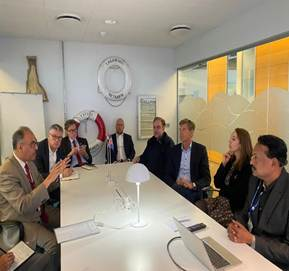Icelandic collaboration to further boost India’s Blue Economy
By IANS | Updated: September 12, 2025 16:45 IST2025-09-12T16:44:34+5:302025-09-12T16:45:07+5:30
New Delhi, Sep 12 India and Iceland are set to enhance collaboration in fisheries and aquaculture, emphasising sustainable ...

Icelandic collaboration to further boost India’s Blue Economy
New Delhi, Sep 12 India and Iceland are set to enhance collaboration in fisheries and aquaculture, emphasising sustainable practices, zero-waste models, technology transfer and cluster-based development, the government said on Friday.
An Indian delegation, led by Dr. Abhilaksh Likhi, Secretary of the Department of Fisheries, completed a three-day official visit in Iceland's Reykjavík to strengthen bilateral cooperation through strategic partnerships, investment promotion, and innovation exchange, an official statement said.
Likhi met with senior representatives of the Iceland Ocean Cluster and discussed cooperative innovation in fish processing, value addition, traceability, and certification. BRIM and Hampiðjan, leading Icelandic companies, provided insights into their advanced zero-waste models and cutting-edge processing technologies.
"Both sides explored investment opportunities for the Icelandic seafood processing industry in India, along with ways to deepen business-to-business (B2B) linkages," the statement said.
The delegation also visited MATIS, Iceland’s top food and biotech R&D institute, to discuss cooperation in biotechnology, food safety, and marine resource utilisation. The visit opened new avenues for collaboration in research and technology transfer to bolster India’s fisheries value chain, the release added.
Emphasis was also laid on training and capacity building in deep-sea fishing technologies, alongside the adoption of advanced vessel monitoring and surveillance (VMS) systems, the ministry of Fisheries said.
The two sides explored opportunities in deep-sea fishing technologies, vessel monitoring systems, trout farming, and tuna innovations for India's islands.
The government has adopted a cluster-based development model under the PMMSY, with 34 clusters notified so far. The cluster-based approach enhances competitiveness and efficiency by uniting geographically connected enterprises of all sizes - micro, small, medium, and large-across the entire value chain, from production to exports.
The country’s total fish production has grown by 104 per cent from 96 lakh tonnes in 2013–14 to 195 lakh tonnes in 2024–25, as inland fisheries expanded by 142 per cent for the same period from 61 lakh tonnes to 147.37 lakh tonnes, according to government data.
India stands as the second largest fish producing nation in the world, contributing around 8 per cent of global output.
Disclaimer: This post has been auto-published from an agency feed without any modifications to the text and has not been reviewed by an editor
Open in app